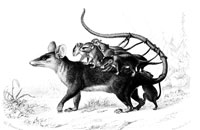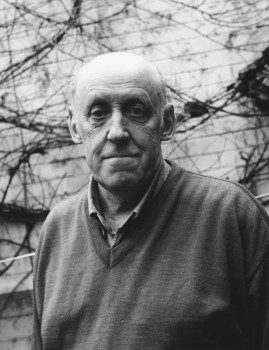Search results for "sofi oksanen/feed/www.booksfromfinland.fi/2012/04/tuomas-kyro-mielensapahoittaja-ja-ruskea-kastike-taking-offence-brown-sauce"
Practically public
31 December 2002 | Archives online, Fiction, poetry
Poems from Koko tarina (‘The whole story’, Tammi, 2002). Introduction by Anselm Hollo
Pan shot
A whitewashed wall, small windows
advent calendar peepholes at the end of darkness,
lit-up squares
One two three kitchens awake at 7
each tenant bends over a kettle of porridge
in the gurgling coffeemaker’s soundscape,
opens the refrigerator
see the hunter in action: let’s spear this yoghurt
and the building across the way testifies to all of this
practically public activity
the evening’s closure of curtains, turnings-off of the light,
nocturnal breastfeedings. Talking windows. A light comes on at: 2:54 AM
– what’s up now?
Is someone thinking about a bird she encountered at the cemetery? More…
Too beautiful
2 July 2009 | Extracts, Non-fiction

Illustration: The Universal Dictionary of Natural History (Paris, 1849)
Extracts from the collection of essays Kutistuva turska ja muita evoluution ihmeitä (‘The shrinking cod and other evolutionary marvels’) by Hanna Kokko & Katja Bargum
Who cannot but stand in awe of the genius of various parasites’ nervous system manipulations or of how beautifully the orchid ensures its pollination? The astonishingly precise adaptations of organisms are the starting point for the idea of Intelligent Design. According to Intelligent Design, such adaptations are too perfect to be products of evolution – rather, they reveal the actions of an intelligent designer. It’s a fascinating idea, write Hanna Kokko and Katja Bargum – but is it science? More…
Hearth, home – and writing
30 December 2007 | Archives online, Extracts, Non-fiction
Extracts from Fredrika Runeberg’s Min pennas saga, (‘The story of my pen’, ca. 1869–1877). Introduction by Merete Mazzarella
The joy and happiness I experience at being able to see into [her husband] Runeberg’s soul, at living with him in his heart and his thoughts, belong far too firmly to the mysteries of my soul that I should wish to attempt to express them in words. But of the life that existed around us I should like to try and give an impression of sorts.
We moved to Borgå in 1837. I was unfamiliar with the town and knew only a little old lady, weak with age, and found myself very lonely indeed, accustomed as I was to living with relatives and a genial circle of friends. I did, however, still have my two eldest sons at home to keep me happy and occupied. More…
All in good time
17 April 2009 | Letter from the Editors
 So here it is, Books from Finland’s new website. From the decision to abandon print and go online it’s been a long and sometimes circuitous journey to get here – a journey that has been far longer in the imagining than in the making. More…
So here it is, Books from Finland’s new website. From the decision to abandon print and go online it’s been a long and sometimes circuitous journey to get here – a journey that has been far longer in the imagining than in the making. More…
Nature’s not my thing
A short story from Hommes (Tammi, 2006)
Lying unemployed on my sofa I hear a lot of stuff on the radio almost every day you hear some children’s choir chanting the same songs over and over about our country’s blue lakes the sky and all our trees and their white trunks. They’ve all finally worked their way into my subconscious. After hearing enough of these songs my subconscious rears its head and commands my idle body: go to the forest. In a situation like that it’s hard to put up a fight or struggle against something you can’t see or hear or smell that all of a sudden pops into your head.
The great debate was over so quickly that hardly anyone managed to get a word in I think to myself as I lie in bed at night just before falling asleep. More…
The Canada goose
31 December 2008 | Archives online, Fiction, Prose
A short story from Tapaus Sidoroff (‘The Sidoroff case’, WSOY, 2008). Introduction by Kristina Carlson
It was no use even trying the old cart track branching from the main road. I turned off the engine and glanced into the back seat. My aunt lifted the brim of her hat, her bright eyes peering at me questioningly.
‘We can’t get any farther by car. The road’s nothing but rough brush. What do you think, Aunt Alli, can you walk the rest of the way?’
My aunt shook her head and didn’t even bother to answer. She opened the car door and clambered out. A swarm of black flies wafted into the air from the brush at the bottom of the ditch.
‘For heaven’s sakes, there’s sure enough of these flies.’
She fanned at the air with her hat, straightened the hem of her dress and trudged across the ditch, without looking back, through the thicket of willows. In spite of her hip trouble, the old woman made her way in such a hurry that I had my work cut out keeping up with her. More…
Burnt orange
30 September 1992 | Archives online, Drama, Fiction
Extracts from the play Poltettu oranssi (‘Burnt orange‘): ‘a ballad in three acts concerning the snares of the world and the blood’. Introduction by Tuula Hökkä
The scene is a small town in the decade before the First World War
Cast:
DR FROMM
an imperial,bearded middle-aged gentleman
ERNEST KLEIN
a moustached, ageing, slightly shabby leather-manufacturer
AMANDA KLEIN
his wife, well-preserved, forceful, angular
MARINA KLEIN
their daughter, shapely, withdrawn, wary
NURSE-RECEPTIONIST
open, direct, not too ‘common’
ACT ONE
Scene two
After a short interval the receptionist opens the door and ushers Marina Klein into the surgery. Exit the receptionist. Marina immediately goes to the end of the room and presses herself against the white wall. The white surface makes her look very isolated in her ascetic black dress. The Doctor, who now appears to be headless – an impression produced by the lighting and the yellowish background – half-turns towards her. More…
Melba, Mallinen and me
30 June 1993 | Archives online, Fiction, Prose
From Fallet Bruus (‘The Bruus case’, Söderströms, 1992; in Finnish, Tapaus Bruus, Otava), a collection of short stories
After the war Helsingfors began to grow in earnest.
Construction started in Mejlans [Meilahti] and Brunakärr [Ruskeasuo]. People who moved there wondered if all the stone in the country had been damaged by the bombing or if all the competent builders had been killed; if you hammered a nail into a wall you were liable to hammer it right into the back of your neighbor’s head and risk getting indicted for manslaughter.
Then the Olympic Village in Kottby [Käpylä] was built, and for a few weeks in the summer of 1952 this area of wood-frame houses became a legitimate part of the city that housed such luminaries as the long-legged hop-skip-and-jump champion Da Silva, the runner Emil Zatopek (with the heavily wobbling head), the huge heavyweight boxer Ed Saunders and the somewhat smaller heavyweight Ingemar Johansson who had to run for his life from Saunders. More…
Thunder in the east
31 December 1991 | Archives online, Fiction, Prose
Extract from the novel Colorado Avenue (Söderström & Co, 1991). Introduction by Pia Ingström
Come. We are going to look at schoolmaster Johansson’s photographs.
It is true that Johansson himself died of TB back in 1922, and the collection of glass negatives he left behind – several dozen boxfuls – was destroyed in a peculiar manner. This, however, constitutes no hindrance to us. Where reality falls short, fantasy must intervene. By expanding realistic style beyond the scope of the possible we create a new reality.
To seek to grasp at Time and hold her fast is a dangerous and hopeless undertaking; Time wreaks a terrible revenge on those who seek to rise up against it. Thus, too, was schoolmaster Johansson’s dream of eternity with the help of silver nitrate and glass frustrated. In the spring of 1926 schoolmaster Johansson’s household effects were finally sold by auction. A certain Eskil Holm from Blaxnäs snapped up the glass negatives for a small sum. More…
The life of a lonely friend
30 September 1986 | Archives online, Fiction, Prose

Bo Carpelan. Photo: Charlotta Boucht
Extracts from Bo Carpelan‘s novel Axel, ‘a fictional memoir’ (1986). In his preface to the novel Bo explains how he ‘found’ Axel.
Preface
In the 1930s I came across the name of Axel Carpelan (1858-1919), my paternal grandfather’s brother, in Karl Ekman’s Jean Sibelius and His Work (1935). In the bibliography, the author briefly mentions quotes from letters in the book addressed to Axel Carpelan, ‘who belonged to the Master’s most intimate circle of friends, and in musical matters was his constant confidant. Sibelius commemorated their friendship by dedicating his second symphony to him’. I had never heard Axel’s name mentioned in my own family.
Many years after Karl Ekman, the original incentive for the novel about Axel arose through Erik Tawaststjerna’s biography of Sibelius, in which Axel is portrayed in the second volume (1967) of the Finnish edition, and whose life came to an end in Part IV (1978). From early 1970s onwards, I started notes for Axel’s fictional diary from to 1919. It is not known whether Axel himself ever kept a diary. I relied as muchas possible on all the available facts. These increased when I was given access to letters exchanged between Axel and Janne from the year 1900 onwards. It became the story of the hidden strength a very lonely and sick man, and of a friendship in which the give and take both sides was far greater than Axel himself could ever have imagined.
Hagalund, June 1st, 1985
Bo Carpelan
![]()
1878, Axel’s diary
15.1.
On my twentieth birthday, I remember the young Wolfgang; ‘Little Wolfgang has no time to write because he has nothing to do. He wanders up and down the room like a dog troubled by flies’. However, that dog achieved a paradise. I have learnt yet one more piece of wisdom: ‘It is my habit to treat people as I find them; that is the most rewarding in the long run’. More…
Hamlet in blue velvet
22 January 2010 | Fiction, poetry
Physical, mythical, sensual, playful: Sirkka Turkka’s poems, never abstract, speak of life, death, dogs, horses, nature and humans. In her universe the humorous and the grave socialise without effort. These texts, in prose form, with Hamlet as one of the characters, are often set in a wintry landscape (see Nature girl)
Poems from Yö aukeaa kuin vilja (‘The night opens like corn’, Tammi, 1978)
Of his early childhood, Hamlet really only remembered his father’s slightly crooked and gnarled index finger, pointing at the lowest branch of a holly oak. A small owl sat on it. It can’t see anything, it’s asleep now. It won’t fly off until night. These were the only words Hamlet remembered his father saying to him during the first six years of his life. Later, all he saw of his father was his back, bent over in study of agricultural conditions in a village called Jawohl or of waterside traffic on the river Vistula at the turn of a particular century. When it came to governmental matters, the king placed his trust chiefly in his unconscious and in wheat bread, thick white slices of which he devoured from the moment he awoke. More…
Suburban dreams
30 March 2004 | Fiction, Prose
Extracts from the novel Kahden ja yhden yön tarinoita (‘Tales from two and one nights’, Sammakko, 2003)
Reponen, Tane, Aleksi and Little Juha; once we all climbed up the path to the old dump with bows on our backs, our arrows sticking out from the tops of our boots. It was April. In the field above the dump puddles reflected the opaque sky, where we were going to shoot our arrows.
The field was the highest point in our neighbourhood. We could see the shopping centre, the library and the sawdust running track through the school woods. We could see the high-rise flats on Tora-alhontie road and the huts in the allotments. We could make out the thick spruce forest of Sovinnonvuori along the greenish grey coastline at Kapeasalmi. Our homes sat there below us. Softly droning cranes, yellow totem animals of hope, swung back and forth above the unfinished houses. In the distance was the centre of town with all its churches and scars. Here everything was just beginning. The swaggering confidence of ten-year-old boys was straining within us and would carry us far like Geronimo’s bow. More…
In the mirror
30 September 2003 | Archives online, Fiction, Prose
Extracts from the novel Helene (WSOY, 2003). Introduction by Leena Ahtola-Moorhouse
It was raining that day, and I was leafing through art books, as I often do, in the bookshop. Then I happened to pick up a work in which there was a picture; a bowl of apples, one of which was black.
Stories often begin like this, inexplicable as deep waters, secret as an unborn child which moves its mouth in the womb as if it wished to speak. For people do not seek mere understanding… people seek the sulphurous, tumultuous shapes of clouds; people seek bowls of apples of which one is black.
I bought the book and made an enlargement of the still life; on the wall, it was even more remarkable, for its correct position was standing up, tête à tête, looking straight at you, unblinking.
The apples seemed to move, to speak. I began to ponder them more and more. In the end I had to read everything I could lay my hands on about the still life’s painter. I had to visit Hyvinkää, where she lived for a long time, and touch her tree in Tammisaari with my hand. I had to travel as far as Brittany to see the rugged landscape that meant so much to her. More…
About calendars and other documents
30 June 1982 | Archives online, Fiction, Prose
An extract from Sudenkorento (‘The dragonfly’, 1970). Introduction by Aarne Kinnunen
I now have. Right here in front of me. To be interviewed. Insulin artist. Caleb Buttocks. I have heard. About his decision. To grasp his nearly. Nonexistent hair and. Lift. Himself and. At the same time. His horse. Out of the swamp into which. He. Claims. He has sunk so deep that. Only. His nose is showing. How is it now, toe dancer Caleb Buttocks. Are you. Perhaps. Or is It your intention. To explain. The self in the world or. The world. In the self. Or is It now that. Just when you. Finally have agreed to. Be interviewed by yourself. You have decided. To go. To the bar for a beer?
– Yes. Can you spare a ten?
– Yes.
– Thanks. See, what’s really happened is that. My hands have started shaking. But when I down two or three bottles of beer, that corpse-washing water as I’ve heard them call it, my hands stop shaking and I don’t make so many typing errors. If I put away six or seven they stop shaking even more and the typing mistakes turn really strange. They become like dreams: all of a sudden you notice you’ve struck it just right. Let’s say, ‘arty’ becomes ‘farty’. Or I mean to say, ‘it strikes me to the core’ I end up typing ‘score’. It’s like that. A friend of mine, an artist, once stuck a revolver in my hand. Imagine, a revolver! I’ve never shot anything with any kind of weapon except a puppy once with a miniature rifle. My God, how nicely it wagged its tail when I aimed at it, but what I’m talking about are handguns, those shiny black steelblue clumps people worship as heaven knows what symbols. It’s not as if I haven’t been hoping to all my life. And now, finally, after I’d waited over fifty years, it turned out that the revolver was a star Nagant, just the kind I’d always dreamed of. So if I ever got one of those, oh, then would sleep through the lulls between shots with that black steel clump ready under my pillow. Well, my friend the artist set out one vodka bottle with a white label and three brown beer bottles with gold labels on the edge of a potato pit – we had just emptied all of them together – stuck the fully loaded star Nagant into my hand, took me thirty yards away and said:
– Oh, Lord. More…
The guest event
12 November 2010 | Fiction, Prose
A short story from Vattnen (‘Waters’, Söderströms, 2010)
It was a lagoon. The water was not like out at sea, not a turquoise dream with white vacation trimming on the crests of the waves. This water was completely still and strange, brown yet clear, sepia and umber, perhaps cinnamon, possibly cigar with the finest flakes of finest wrapper. Clean. This water of meetings was clear and clean in a non-platonic, remarkably earthbound way.
Sediment and humus, humus floating about in the morning sun.
It felt comforting, as if the water didn’t repel the foreign bodies as a matter of course, didn’t immediately suppress the other particles and sanctimoniously hasten to force anything that wasn’t water, anything that could be interpreted as pollution and encroachment, down to the bottom and let it dissolve and die all by itself. This water sang its earth-brown song of unity without thereby becoming any less water than water-water was.
Helena felt cold. More…
